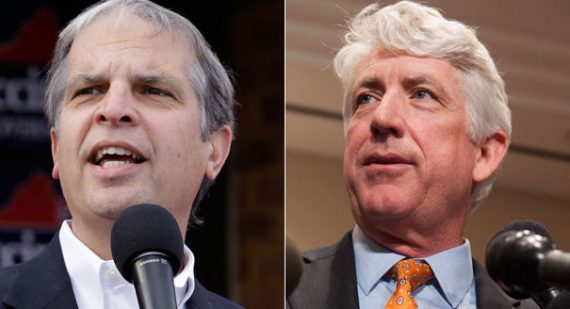Democratic Candidate Gaining Votes In Virginia Attorney General’s Race Recount
The Virginia Attorney General's race recount seems to be going in favor of the Democratic candidate.
Yesterday concluded the second day of the recount in the Virginia Attorney General’s race and, so far, it is most certainly moving in favor of Democratic candidate Mark Herring:
Democrat Mark R. Herring continued to widen his slim lead over Republican Mark D. Obenshain in the race for Virginia attorney general Tuesday as the recount of the historically close contest spread statewide.
Herring’s lead grew to more than 810 votes, with 73 percent of ballots across the state recounted, according to Herring’s campaign.
Fewer than 120 ballots had been “challenged,” the campaign said, meaning recount officials could not agree on how they should be counted and will forward them to a special recount court in Richmond that will begin its work Wednesday.
The Democrat’s lead was between 811 and 866, depending on how many of the challenged ballots are ultimately counted, Herring attorney Marc Elias said in a conference call with reporters. Herring’s lead is the larger number if all of the challenges are overturned, the smaller one if they are all upheld.
“We continue to gain margin at a steady pace, and we expect to continue to do so through the rest of the day and through the rest of the recount,” Elias said. ”We remain confident that Mark Herring will be declared the winner of the recount.”
It is not clear what Obenshain will choose to do if, at the end of the recount, Herring leads by more votes than there are challenged ballots.
“This is an ongoing process,” said Obenshain spokesman Paul Logan. “It’s important to see it through and ensure that we get an accurate result. That’s been our goal since the minute polls closed.”
Both campaigns dispatched legions of volunteers to courthouses across the state. Herring’s campaign issued updated tallies throughout the day through conference calls with reporters and Twitter. Obenshain’s campaign did not announce running tallies, but it did not publicly take issue with those provided by the opposing campaign.
The race to succeed Attorney General Ken Cuccinelli II (R) has turned into a protracted nail-biter, one that will not only determine who serves as Virginia’s top law-enforcement official but also could shift control of the evenly split state Senate.
Herring and Obenshain are both senators, and an election would be held to replace whichever one becomes attorney general. Because Obenshain hails from reliably conservative Harrisonburg and Herring from battleground Loudoun County, a win by Herring could cause the Democrats to lose sway in the Capitol. The GOP has a wide margin in the House.
If the 800-vote lead holds, the race will lose its distinction as the closest statewide election in Virginia history. At least initially, the attorney general’s race appeared to knock out the current record-holder, the 2005 contest for attorney general between then-Del. Robert F. McDonnell and Sen. R. Creigh Deeds (D-Bath). McDonnell won that race by 360 votes.
Under Virginia law, most jurisdictions in the state will have to finish their recount by midnight tonight and send any challenged ballots to the three judge panel in Richmond that has been assigned the task of reviewing the challenged ballots that are sent to it to determine if the ballot should be counter, and for which candidate it should be counted in favor of. That task will likely be done by Friday and they panel could issue their ruling on the recount by the end of the day that day or at some point shortly thereafter depending on how quickly they are able to finish their business. If the current trend continues, though, there seems to be no doubt that Herring will be declared the winner, and that it will occur by a wider margin than initially anticipated.
There has been some discussion on Twitter about how it’s possible that Herring has gained far more votes in this recount than Bob McDonnell did in the 2005 recount when he gained less than 100 votes in what, for the moment, remains the closest statewide race in Virginia history. The answer lies in the fact that, in the wake of the 2005 race, the recount law was changed to require jurisdictions to examine ballots in order to determine voter intent rather than merely rerunning them through the optical scanners that are used to count ballots in most Virginia jurisdictions at this point in time. In many jurisdictions, this has resulted in discovering ballots that were not correctly marked, and thus not counted by the scanners, but on which voter intent is clearly evident. Thus, many ballots that were initially counted as ballots where a vote was cast for say, Governor and Lt. Governor but not for Attorney General are now required to be included as counted in the recount in the Attorney General’s race. Ballots where the examiners are unable to agree on the intent of a voter usually end up being the challenged ballots that are being sent to the three judge panel. Apparently, there were a lot of voters in 2013 who didn’t correctly mark their ballots, a development which may suggest that Virginia needs to redesign its ballots to make sure they are easier to understand.
In any event, this race isn’t necessarily going to be over when the three judge panel announces it decision at the end of the week. As I’ve noted before, Virginia law gives the losing candidate in a race the right to petition the General Assembly and contest the election results due to some alleged irregularity. The General Assembly, currently dominated by Republicans would then hold a hearing and decide the election itself. Given the GOP’s dominance in the legislature, it would of course be quite easy for the GOP to give the election to Republican nominee Mark Obenshain. However, it strikes me that this becomes more politically difficult as Herring’s lead grows in the recount. If we come to the end of the week and Herring’s lead is far ahead of the amount of challenged ballots out there, which seems quite probable at this point, then any effort by the GOP to overturn the result in this manner would quite likely not go over very well with the public, and Obenshain would have a very difficult four years in office as he deals with the perception that the election was stolen in a blatantly partisan manner. So far, the Obenshain campaign has not ruled out the possibility of a contest, which makes sense while the result remains in doubt. However, it strikes me that it would be quite foolish to try to use an election contest to take away an election where the result seems evidently clear.
Update: Reports this afternoon indicate the Obenshain will be conceding the race before the end of the day.





What more needs to be said about the Republican love of Democracy?
Obenshain has a safe seat in the State Senate right now. If he ends up with a 500-700 gap at the end of the recount there’s no reason to believe that he wouldn’t simply accept the result, go back to the Senate, and gear up for a run for Governor in 2017. Taking the contest route would essentially ruin his political future.
He may be a politician, but he doesn’t strike me as too stupid to see which of those two options would be the smarter choice.
@Doug Mataconis:
If he ends up with a 500-700 gap at the end of the recount there’s no reason to believe that he wouldn’t simply accept the result
I’ve got a reason. He’s a Republican.
You know, every time there is a recount these “found” votes do nothing to support faith in the integrity of our voting system. At least, they didn’t find them in somebody’s trunk this time.
@mantis:
well that, and…
Fascinating. Florida used to have that requirement but it was deleted in the wake of the Bush v Gore fiasco. Florida recounts are now not only _not_ run through the scanner again, they’re simply re-downloaded from the device that the scanner talks to, with zero concern about voter intent.
Clearly VIrginia Republicans need to step up their voter supression efforts. Maybe they should take lessons from North Carolina.
It’s almost a given that recounts will favor the Democratic candidate. Going back to 2000—when the process first came on the national radar screen—every single major race that’s gained national attention and gone to a recount wound up with the Democrat winning. Presumably, it’s a function of their constituency being poorer and less literate and therefore less able to follow the seemingly simple rules of marking one’s ballot. The upshot, then, is that the “voter intent is clearly evidence” ballots are going to lean heavily Democratic.
@James Joyner:
Spoken like a card-carrying member of the old wealthy white guy party.
@C. Clavin: It’s not disputed that Democratic candidates almost always gain more votes than Republicans in recounts. My explanation is that this is a function of underprivileged voters among the Democratic cohort. What’s yours?
@C. Clavin:
@James Joyner:
Benjamin Tribbett, a Virginia political blogger who is most definitely a Democrat, has noted that, at least in Fairfax County, the majority of the incorrectly marked ballots have been ballots in which the voter clearly intended to vote for Herring, the Democratic candidate.
See his Tweets on the subject here, here, and here.
This would seem to confirm the observation that James made.
@James Joyner: I expect lower levels of literacy are a significant part of it. And the system should, as it is in VA, accommodate that. I don’t know about VA, but in much of the country, Dems are also more likely to be first time voters, have less familiarity with “office like” procedures, have an impatient line of people waiting behind them, be in a rush to get to work, and be served by proportionally fewer and older machines. Remember, we’re not talking about Dem ballots in general being unclearly marked, we’re talking about a fraction of a percent at the margin.
@James Joyner:
Most likely it’s Democrats trying to get to work…instead of the 1% acting at their leisure.
@gVOR08: Yes, that’s right. I’m not arguing that most Democratic voters are unable to comply with the rules, merely that most of those unable to comply with the rules are Democrats.
@C. Clavin: That just doesn’t make sense. This is, by definition, a 50-50 election. The 1% are not the decisive factor.
@James Joyner:
Actual lay it makes as much if not more sense than your comment re: Democrats being illiterate.
Don’t you have another Messiah post to write?
Latest word is that Obenshain will concede on Wednesday.
@David M:
Yep, according to reporters there is a 3pm press conference scheduled in Richmond.